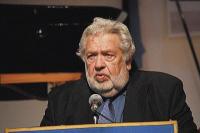
Russia officially annexed Crimea from Ukraine after it had invaded the region and after 90% of Crimeans voted to join the Russian Federation. Subsequently opinion polls have shown that the percentage of residents in Crimea that opted for joining the Russian Federation was actually much smaller leading one to conclude that the results of the vote had been grossly falsified.
During the period of the Crimean annexation Russia voiced concern (in some instances, outrage – a reaction not commensurate with actuality) about Estonia`s treatment of Russian ethnic minority community. Moscow compared language policy in Estonia with Ukraine`s attempts to prevent the use of Russian – an accusation that does not reflect the real facts. About a quarter of Estonia`s population are Russian speakers, approximately the same proportion that exists in Ukraine.
At the Human Rights Council in Geneva, a Russian diplomat had said that ``Language should not be used to segregate and isolate groups. Russia is concerned by the steps taken in this regard in Estonia as well as Ukraine.`` This was a gross misrepresentation of the actual situation.
These accusations have been made repeatedly over many years. The deliberately ignore the fact that Estonia`s goal, through the gradual introduction of Estonian as the language of instruction for some subjects, is to have Russian speakers in north east of the country be able to speak Estonian.
At least 10,000 Crimean Tatars have left Crimea since the Russian takeover. Knowing this one is reminded of what happened in the areas of north-east and south-east Estonia when some 2,235 sq. kms. (including Petseri and east of the Narva river) were illegitimately transferred at the end of 1944 to the Russian SSR. It had an ethnically mixed indigenous population of 56,000 of which 19,000 were Estonian. In Petseri, Estonians even formed a majority.
Advertisement / Reklaam
Advertisement / Reklaam
For non-Russians their ethnic cultures and languages were not given the means to be promoted and maintained. Their media, schools, clubs, associations were abolished. Russia had proclaimed some years earlier its new foreign policy directions and one of the fundamental principles to which it vowed to adhere was the `protection` of ethnic Russians` language and cultural rights outside its borders – vigorously.
Historically, this not the first time such reasons have been given for military aggression. Some narratives of the past put the emphasis on the protection of marginalized German-language speakers when 80 years ago Germany began its annexation of nearby states. It was seen as Hitler’s asserted desire to ‘unite and protect’ all German speaking peoples. The West turned a blind eye for some years.
Jaak Aaviksoo, former defense minister, former rector of Tartu University and currently a member of parliament, in reference to Social Democrat candidate Inna Nazarova`s campaign promise to negate the requirement for partial Estonian instruction in Russian language schools said: ``At first the demand is set in a calm and reserved manner. One doesn`t have to see into the future to realize that the re-Russification of schools is the first step in making Russian an official state language. The loud proponents of this have made no secret of it on Russian TV. … It doesn`t take much to understand that the war in eastern Ukraine got its start also from an unemotional discussion about language policy. A British general has directly referred the Nazarova`s promises as a provocation.``
Martin Hurt of the Estonian ``International Centre for Defense Studies`` sees the situation between Estonia and Ukraine having significant differences: ``But there are major differences with the Ukraine situation. The NATO alliance of course, provides a massive deterrent and Estonia has been a member of the EU for the last ten years. The Russian minority understands its benefits and the lesser standard of living across the border.``
Advertisement / Reklaam
Advertisement / Reklaam
These conclusions are also supported by scholar Kaja Koort: ``…local Russians largely disagree with Russian troops going into Estonia under the label of `protection of their compatriots` ….`` `we know how little Russia actually cares about Russians.`` But she continues: ``The role of Russian media in inciting such ethnic hatred cannot be underestimated, even more so because the standards of official Russian media have sunk back to where they were during the depths of the Cold War. … The nightly program transmits an exaggerated and biased picture of an evil and threatening Western world that now includes the Baltic states, Georgia and Ukraine. … Ironically Russia`s actions in Ukraine today are very much like those of Nazi Germany in Austria and Czechoslovakia in 1938-1939. In this light Putin`s assertion that the collapse of the Soviet Union was the greatest geopolitical catastrophe of the last century sounds especially ominous``.Laas Leivat
























